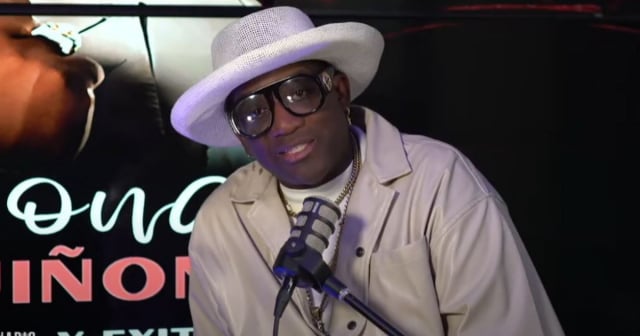The Cuban actor Conrado Cogle (Havana, January 21, 1971), known for his mythical humorous character Boncó Quiñongo, has granted an interview to CyberCuba to talk about his interpretation of Alfredo, in the film Plantados, by Lilo Vilaplana. The change of record has surprised those who only knew of him as a comedian.
At just 50 years old, Boncó has achieved success and he knows it. "I feel like a winner because I have worked for that," he tells this newspaper, not without warning that in no case is this the end of the journey.
"There's no one to stop me. I'm going to get to Hollywood," he adds, previewing a project he has in hand, in addition to his advertising contracts, his radio show in Miami or his jewelry store Five Star Jewelers, in Florida and his family. That's where his catchphrase comes from: "Emprendao."
Account Bonco that he was born on a plot of land in Santos Suárez and that as a child he did not have his own room and slept on the sofa in his house, which was not a sofa bed. That's why, when he was little, he dreamed of having his own showcase, even a drawer all to himself.
After his entry into the Cuban program Sabadazo, who was driving Carlos Otero, Boncó had his apartment, filled stages and soon realized that he had reached his peak in Cuba.
Nobody gave him anything. He assures that it was difficult for him to enter Sabadazo because Carlos Otero first called Gustavito, Antolín... "the white guys." But as soon as he had an opportunity, he entered with that character that he no longer plays: that of a black man with little educational training, who called for order with his famous L-L-A (since) that on one occasion he even heard it from a police officer. in a line on the 400 to go to the beach, in Havana. To impose order, the agent said: "L-L-A."
"I no longer play black criminals," he clarifies to summarize the evolution of his career, which was already successful at that time, but could not continue growing.
"If I stayed in Cuba the only thing I was going to see in that country was the decline of my efforts," he confesses to CyberCuba. It was then that he emigrated to Spain, where he lived for six years, before settling permanently in Miami.
From that stage he remembers that the Cuban authorities did not let him return to the island for eight years, so he missed his daughters' childhood. He was even banned from entering at the beginning of the cultural exchange years of the Obama era.
Finally he was able to travel to Cuba with the condition that he could not take a mass bath. I agree. He went to see his family. His father, whom he admires and mentions several times during the interview, was already having health problems at the time.
His vision of what was happening in Cuba changed after arriving in Miami. At that moment he had the opportunity to be guided to learn the other side of Cuban history: the truth of the plantations, of exile, of Alpha 66... Little by little he opened his eyes.
This is how Boncó arrives at the interpretation of Alfredo, a character that has a lot of the planted prisoner Eusebio Peñalver Mazorra, who had been captain of the Rebel Army and who ended up rising in Escambray; condemned and beaten in prison for being against Castroism like the rest of the planted, but also for being black.
About his character, Conrado Cogle says that he prepared his role by listening to the testimonies of many jilted people. From that experience he remembers the lump in his throat and the desire to cry when listening to the stories of the cruelty experienced.
He puts himself in the shoes of the detainees and thinks that the best of his career has been developed between the ages of 20 and 40, the period that these men spent walled up in Cuban prisons and subjected to forced labor, even stuck inside lagoons of excrement drain.
That is why he is convinced that he has had the privilege of playing a Cuban hero. "That black man (Eusebio Peñalver Mazorra) is a Maceo; one of the greats," he said.
He has been so satisfied with his work that he assures that he is willing to repeat the experience of playing another dramatic character.
At this point in his career, after winning the Silver and Gold Gaviota award at the Viña del Mar Festival in 2019, Boncó Quiñongo confesses that the recipe for success was given to him by his father: not to set limits and try twice as hard as others because in Cuba it is not easy to succeed being black.
"He who works twice as hard is prepared twice as much," he admits.
Now we have to see if the Hollywood project comes together and dream of a future performance in the Plaza Cívica in Havana, during a macro concert. He dreams of going on stage and performing in a free Cuba.
What do you think?
COMMENTFiled in:
